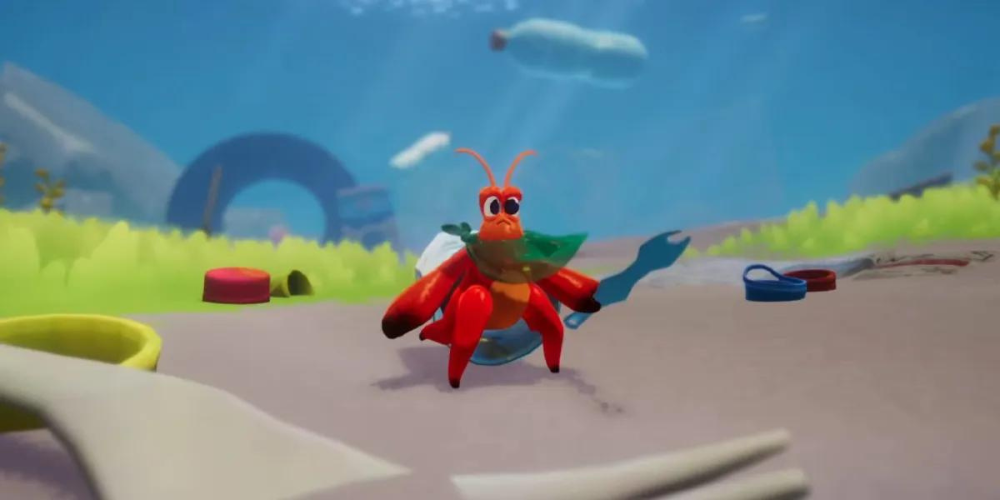Diverse Depths: Navigating Challenges and Discovery in Another Crab's Treasure
- 1079

In a crowded field of tough 3D action games, making a memorable impact requires either matching the gameplay prowess of its predecessors or introducing a novel twist. Another Crab's Treasure navigates this challenge adeptly, offering combat that holds its own while excelling with remarkable 3D platforming. The narrative centers on a crab named Kril, who begins his journey simply wanting to retrieve his lost shell but ends up discovering the broader complexities of the ocean. This tale, though slow to gain traction, weaves a captivating fabric of adventure and insight into pollution in marine life.
The adventure kicks off with Kril's shell being taken as a tax by a wealthy ruler, propelling him on a treasure hunt that spans the ocean. The narrative framework evolves from Kril's personal quest to broader environmental themes, presenting a picture that is both sobering and authentic. Instead of veering towards a clichéd happy ending, the story concludes on a more nuanced note, resonating with the game's underlying themes of struggle and resilience.
In terms of level design, the game is divided into expansive areas teeming with enemies and platforming tasks that seamlessly blend together. Players must traverse these spaces to gather objectives like treasure map fragments or reach distant structures. While mostly balanced, the difficulty occasionally spikes, particularly in platforming sections monitored by ranged adversaries. Navigating these zones without succumbing to ranged attacks that devastate your health can be grueling, but such moments are rare.
Guidance within these open levels is sparse. No objective markers are provided, and current goals can't be quickly reviewed. This lack of direction is generally manageable, as objectives are pieced together through cutscenes or dialogues with in-game characters. However, some puzzles contribute to potential confusion. In the factory area, for example, a puzzle that transitions to the next map section can be activated early but remains unsolvable without prerequisite steps. Similarly, another puzzle involving a magnet for platforming hinges on a hidden mechanic--holding the block button--that an NPC neglects to specify, enhancing the frustration of unclear instructions. Despite these minor setbacks, the level design typically guides players effectively without needing explicit markers.
The platforming stands out due to its straightforward mechanics. With limited yet versatile tools like grappling, hover jumping, and climbing, players navigate increasingly complex obstacles. The game introduces these abilities early, and challenges scale in tandem with the player's growing platforming proficiency. Falling during platforming sequences results in reduced health rather than instant demise, maintaining a buffer that allows players to sustain momentum. Occasionally, environmental elements inadvertently hinder movement, but these instances are infrequent.
Combat mechanics will feel familiar to veterans of challenging 3D action games, featuring staples like dodging, blocking, and parrying. Another Crab’s Treasure distinguishes itself with its unique shell system. Kril uses various objects found in the ocean as makeshift shells, each with specific stats and a special move. These shells shatter frequently, compelling players to constantly adapt and seek new ones. While the ability to insure shells later in the game offers some stability, it’s balanced by high costs and late availability, ensuring it doesn’t disrupt the dynamic.
The game’s toughest challenges lie in battles against stronger enemies and bosses. Mistakes in these encounters are heavily penalized, often resulting in instant failure. Missing a single block can trap players in a relentless enemy attack, making these fights particularly daunting. Unsurprisingly, many defeats stem from a single error, sometimes making the experience feel unfair and exasperating.
Various quality-of-life aspects could benefit from refinement. Acquiring new skills necessitates fast travel to a specific location, interposing multiple loading screens between unlocking and resuming play. Collectible trash, which can be sold for additional resources, also requires fast travel to convert. Moreover, the skills and junk vendors are situated in different areas, extending the downtime between activities.
In conclusion, although Another Crab's Treasure has a few rough edges and punishing adversaries that dull the excitement of its combat, it remains a compelling contribution to the genre. The inventive shell system and emphasis on platforming offer a fresh perspective, and Kril’s journey, while initially unsteady, ultimately justifies the exploration of the vast oceanic setting.
